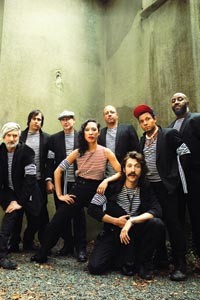Gogol Bordello's performances are like an unhinged pan-cultural carnival, led by colorful frontman Eugene Hütz with his handlebar mustache. The gypsy-punk band floods the stage with energy and personality, along with a pair of costume-changing, percussion-banging dancing girls, and unusual rock instrumentation like accordion, violin and big marching bass drums.
Formed a dozen years ago in New York City by a crew of Eastern European expatriates, Gogol Bordello recently released its major-label debut, the Rick Rubin-produced Trans-Continental Hustle. Along with the band's gypsy-punk underpinnings and rousing anthemic lyrics, the album integrates Brazilian folk elements inspired by Ukranian-born Hütz's move two years ago to Brazil (for a girl, natch). The singer and actor (who has appeared in Everything Is Illuminated and Filth and Wisdom) talked with City Paper via phone from Vancouver.
In your teens, you left Ukraine and spent years shuffling between refugee camps before coming to America -- how did that experience impact you?
A lot of it went into my songs, and it affected me directly -- how can it not? I think at this time I'm probably a lot more at peace with it than I used to be. Chiefly because music is so therapeutic. [Laughs.] But that's why, as a band, we can't really ignore things that are going on in Arizona or in France with Sarkozy, because the immigration experience is already traumatic enough on the way out, and if you get in somewhere it's still traumatic. Too much of it is dealt with in a really rudimentary, bureaucratic way. Some new humanitarian approach needs to be found.
Where does your overwhelming stage energy and presence come from?
The secret weapon that I always had ... was training for the Olympic team in long-distance running in Ukraine for about a decade. So by the time I got into punk rock, at 14-15 years old, I was already champion of Kiev twice in long-distance running.
And moving to America liberated me from the European baggage where being punk rock basically meant staying on the gloomy side of things with an edge of self-destructibility and doing this whole Manchester-England-hunchback-trenchcoat-depressed-intellectual gig. Once I moved to America, and I saw Fugazi and Henry Rollins and people who were positive all around -- not to mention Iggy Pop, with his very powerful stage techniques -- I was just like, "These are my people," and dropped that whole European load, and didn't have to hide my athletic past anymore. I was like, "Fuck that."
As a band we mastered ourselves as a generator of positive energy and consequently the people in the band, the personalities are very much of this kind of powerful energy, positive nature. So, of course, it's like a positive-energy power plant.
After years in New York, you moved to Brazil and have compared its culture to that of Eastern Europe.
Yeah, it was kind of surprising to me, but upon first landing in Brazil, I immediately started feeling, unexplainably so, very at home. Maybe it's just the generally very loose street atmosphere where things are not as institutionalized as they are in Western civilization. There was just a lot of charm and a lot of power in the natural-roots feeling of life. You just don't live and breathe pavement. When you're in Brazil, you live and breathe life.
What was it like working with Rick Rubin? He's known to be quite a taskmaster.
Rick's time with us, and his ability to always see the light in the very mass creative process, was just a beam of light. It allowed us to make a record that was a lot more authentically energetic, which is a very important thing. [With Rubin], unless the band really knew the song and commitment to the character of that song was superb, that was not good enough.
You've built a strong grassroots following that seems to help insulate you from dependence on major-label promotion.
We're essentially a full-on grassroots band. We met our first 100,000 fans with handshakes. We didn't do it for any other reason but having love for music being expressed.
Gogol Bordello with Forro in the Dark. 8 p.m. Thu., Nov. 4. Mr. Smalls Theatre, 400 Lincoln Ave., Millvale. Sold out. All ages. 412-821-4447 or www.mrsmalls.com














